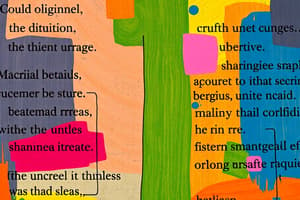Podcast
Questions and Answers
What type of condition is used in the sentence 'If the weather improves, we’ll go for a walk'?
What type of condition is used in the sentence 'If the weather improves, we’ll go for a walk'?
- Certain
- Unlikely
- Possible or likely (correct)
- Impossible
Which type of conditional sentence is used to talk about an imagined future situation?
Which type of conditional sentence is used to talk about an imagined future situation?
- First conditional (correct)
- Zero conditional
- Third conditional
- Second conditional
What is the form of the conditional clause in the first conditional?
What is the form of the conditional clause in the first conditional?
- if + present simple (correct)
- if + past perfect
- if + future simple
- if + past simple
In the sentence 'If a lawyer reads the document, we will see if we’ve missed anything important.', which verb tense is used in the main clause?
In the sentence 'If a lawyer reads the document, we will see if we’ve missed anything important.', which verb tense is used in the main clause?
What is the function of the modal verb in the first conditional?
What is the function of the modal verb in the first conditional?
Which of the following sentences is an example of the third conditional?
Which of the following sentences is an example of the third conditional?
What is the main purpose of using the second conditional in English?
What is the main purpose of using the second conditional in English?
What is the correct form of the conditional clause in the second conditional?
What is the correct form of the conditional clause in the second conditional?
What is the difference between the first and second conditional?
What is the difference between the first and second conditional?
What is the correct form of the main clause in the third conditional?
What is the correct form of the main clause in the third conditional?
What is the function of the third conditional in English?
What is the function of the third conditional in English?
What is the warning about using 'would' in the second conditional?
What is the warning about using 'would' in the second conditional?
Study Notes
Imagined Conditions
- There are different types of conditions: possible or likely, unlikely, and impossible.
First Conditional
- Used to talk about the result of an imagined future situation, when we believe the imagined situation is quite likely.
- Form: if + present simple, modal verb with future meaning (shall/should/will/would/can/could/may/might) in the main clause.
- Examples:
- If the taxi doesn’t come soon, I’ll drive you myself.
- If he gets a job in Liverpool, he’ll have to get up early.
Second Conditional
- Used to talk about the possible result of an imagined situation in the present or future.
- Form: if + past simple, modal verb with future-in-the-past meaning (should/would/might/could) in the main clause.
- Examples:
- If people complained, things would change.
- If you asked her nicely, she would say yes, I’m sure.
Third Conditional
- Used when we imagine a different past, where something did or did not happen, and we imagine a different result.
- Form: if + past perfect, modal verb with future-in-the-past meaning (should/would/might/could) + have + -ed form in the main clause.
- Examples:
- If I had played better, I would have won.
- It would have been easier if George had brought his own car.
Studying That Suits You
Use AI to generate personalized quizzes and flashcards to suit your learning preferences.
Description
Learn about different types of conditionals in English grammar, including possible, unlikely, and impossible conditions. Practice with examples and exercises to improve your language skills.




